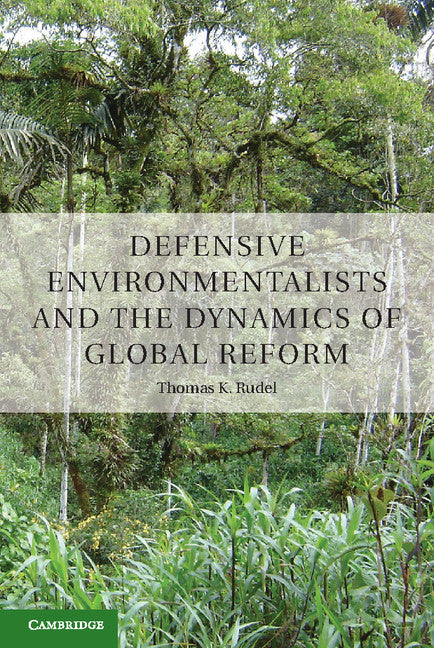Freshly Printed - allow 6 days lead
Couldn't load pickup availability
Defensive Environmentalists and the Dynamics of Global Reform
Rudel examines historical examples of environmental reform, arguing that reforms occur when defensive and altruistic environmentalists join forces.
Thomas Rudel (Author)
9781107030527, Cambridge University Press
Hardback, published 11 March 2013
262 pages, 14 b/w illus. 2 tables
23.5 x 15.7 x 1.8 cm, 0.47 kg
'Rudel's book is an impressive synthesis of literature and ideas about the human-environment. It is lucidly argued and highly readable throughout and would appeal to senior undergraduates, graduates, and established scholars alike. The book would serve well as a core or companion text in courses on general environmental studies and environmental social science.' Bradley B. Walters, Mount Allison University
As global environmental changes become increasingly evident and efforts to respond to these changes fall short of expectations, questions about the circumstances that generate environmental reforms become more pressing. Defensive Environmentalists and the Dynamics of Global Reform answers these questions through a historical analysis of two processes that have contributed to environmental reforms, one in which people become defensive environmentalists concerned about environmental problems close to home and another in which people become altruistic environmentalists intent on alleviating global problems after experiencing catastrophic events such as hurricanes, droughts and fires. These focusing events make reform more urgent and convince people to become altruistic environmentalists. Bolstered by defensive environmentalists, the altruists gain strength in environmental politics and reforms occur.
Preface
Acknowledgments
1. Introduction
2. Meta-narratives of environmental reform
3. Globalization, tight coupling, and cascading events
4. Partitioning resources, preserving resources
5. Advantaging offspring, limiting offspring
6. Choosing foods, saving soils
7. Removing rubbish, recovering resources, and creating inequalities
8. Saving money, conserving energy
9. Focusing events, altruistic environmentalism, and the environmental movement
10. A sustainable development state
11. Conclusion: defensive environmentalists, sustainable development states, and global reform
References.
Subject Areas: Social impact of environmental issues [RNT], Environmentalist thought & ideology [RNA], International relations [JPS]


